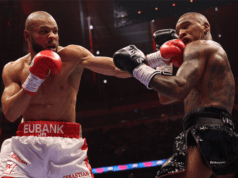Everyone’s 0 Has Got to Go:
Boxing has too many ills to even bother counting off. The sketchy promoters, the bad decisions, the 25 titles per weight class… we all know the drill. One of the major problems in the sport though is the mentality that once a fighter loses, he becomes damaged goods or is no longer a talented prospect or contender. It’s one of many areas in which MMA has vaulted past the old-school, tradition-bound whether it’s better or worse sport of boxing, and in the process created a more marketable and attractive sport.
Losses count more for boxers today than they used to. Being undefeated has become just as important, or more important, than actually beating noteworthy challengers. That’s why so many big-name prospects are groomed for the top by taking on carefully selected, overmatched opponents to pad their records. They’ll grab a title belt with their “0” intact, and then they’ll protect it for as long as possible before facing a stern test and somebody who actually has the ability to beat them.
Losses Used to Be Setbacks, Not Career-Enders
Being undefeated has always been important, and that’s part of why the legend of a boxer like Rocky Marciano is so large; he’s the only Heavyweight Champion to ever retire undefeated. But it has become disproportionately weighted so that few other factors are considered when evaluating a fighter’s potential, marketability or talent.
Sugar Ray Leonard and Muhammad Ali both became more popular after their first losses, to Roberto Duran and Joe Frazier, respectively. Joe Louis was embarrassingly knocked out by Max Schmeling before he went on to become one of the most dominant champions of all-time. Sugar Ray Robinson finished his career with 19 losses; Henry Armstrong with 21; and while each lost more at the tail-ends of his career, both had his own setbacks smack in the middle of their primes as well.
Would any of those fighters have thrived in today’s boxing culture, or would they have been brushed aside because of the small stain on their records? More importantly, would they ever have stepped up to face the tough competition they did, if they knew that one loss could be so irrevocably hard to overcome?
Losses Don’t Matter in MMA
In truth, MMA and boxing are no more comparable than soccer and hockey, and the constant back and forth between the two sports and their fans is pointless. However, one way in which mixed martial arts is clearly superior to today’s incarnation of boxing is in the importance, or lack thereof, of a loss on a fighter’s record.
For a variety of reasons, losses in MMA “count” less. One reason for this is that there are so many more ways to win and lose a fight. Not only can you be knocked out by a punch or lose a decision, you can also be knocked out by elbows, knees or kicks, get TKO’d on your back by ground-and-pound strikes, submitted in a multitude of ways, and on down the line from there. Therefore, it’s easier to forgive a loss as either a bad style matchup, or the omnipresent “he just got caught” reasoning, whether he just got caught with a choke, a kick to the face, or an elbow to the forehead which sprang a Old Faithful-esque blood geyser spewing onto the Octagon canvas.
Not only that, but MMA has also wisely avoided marketing undefeated records and fighters with flawless resumes, and instead has focused on recent trends and accomplishments. The sport highlights only the positives while ignoring the negatives, and has consistently put the best fighters against one another, regardless of the outcome.
When watching a Countdown to UFC program prior to one of their pay-per-views, fans will notice lots of phrases such as a fighter has won “four fights in the past two years”, while the two losses sandwiched in-between are glossed over. The complete picture isn’t needed, or at least isn’t given, and whether fans are less informed or merely aren’t hyperactively obsessed with records and undefeated resumes as a result, either way it’s a smarter approach to marketing the combatants of the sport.
The Impact

Floyd Mayweather Jr. will do anything to protect his “0”. Andre Berto is an undefeated “champion” at 27-0 with five title defenses, but yet has never fought a truly tough opponent. Chad Dawson was one of the sport’s most highly touted young fighters, then he had an off night, lost a fight, and was tossed aside like the two-month-old Chinese food sitting in the fridge you suddenly remembered.
Meanwhile, it’s impossible to climb to the pinnacle of MMA without suffering a loss along the way. The closest anyone in the sport has come to accomplishing this has been Jon “Bones” Jones, who enjoyed an unprecedented and astonishing rise on his way to becoming UFC Light Heavyweight Champion. The only negative on his ledger is a DQ loss to Matt Hamill as he was in the process of unleashing a ferocious beat down. Jones is the exception to the rule however, and his trajectory has been largely unmatched.
Still, the sport of MMA has used this to its advantage by simply forgetting about the whole undefeated angle and instead shifting focus towards different factors, while forcing all of the top fighters to square off against one another. A promising fighter might win, or might lose, but as long as he puts forth a good effort he’ll be back.
The economics and politics of the sports are innately different from one another, but in this regard boxing would be wise to follow its younger cousin. It’s about time that someone pulling the strings for the Sweet Science finally realizes that the only thing more damaging than a loss is an undefeated but airbrushed record. Fans can handle the losses if the fighters and promoters can, but fans cannot handle the so-called career-defining wins which fail to define anything but inadequacy.










